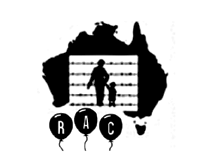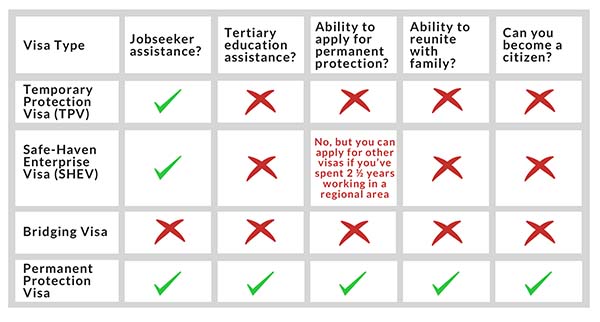Background
In early 2021, over 100 of the refugees and asylum seekers who had been held for almost two years in hotel prisons in Brisbane and Melbourne were released into the community. They were brought to Australia for medical treatment under the Medevac laws, after originally being held for six years on Manus Island and Nauru. It’s fantastic that they’ve been released, but the fight is not over: not only are there still hundreds of refugees incarcerated both offshore and onshore, the released people are not actually free of the government’s torturous policies.
hey join the tens of thousands of other refugees and asylum seekers in the community on cruel bridging, temporary protection and safe-haven enterprise visas, which deny refugees basic social support and force them into poverty.
Who is affected?
The government is creating an underclass of five main groups of people that they are depriving of rights and welfare support:
1. Medevac evacuees – Although they have been held in detention and tortured on Manus and Nauru, they are deprived of Centrelink and supported accommodation and are expected to support themselves. They have work rights, but no access to Centrelink, or the right to study, and many are unable to work due to their medical conditions. They are on “final departure bridging visas” that must be renewed every six months.
2. The “Legacy caseload” – There are over 30,000 people living in the community who have made applications for protection visas, but are on bridging visas. They have work rights, but no access to Centrelink, or the right to study.
3. “Failed” asylum seekers – There are many thousands of “failed” asylum seekers living in the community whose bridging visas have expired. Among them are Tamils, Afghans, Iranians and many others, whose protection applications have been rejected by an unfair asylum assessment process that is biased against them. In any case, they cannot be returned to their home countries. For instance, Afghanistan is simply too dangerous, and other countries like Iran point-blank refuse to accept them. Although living in the community, this group of people have no right to work, no Medicare, no Centrelink and no right to study.
4. Community detention – Some of the people who have been brought from Manus and Nauru are living in community detention. They get a pittance from Centrelink (less than the dole) and have basic accommodation and medical services (but not Medicare). They are not allowed to leave their designated cities without permission, even temporarily – like to visit friends. They get no English classes, and even if they are able to work, are not allowed to.
5. TPV and SHEV holders – They are recognised refugees in Australia but because they arrived by boat are deprived of rights granted to other refugees. Australia refuses to grant permanent visas to any refugees who have arrived by boat. The government falsely describes these people as “illegal maritime arrivals”, despite them breaking no law. They are placed in constant limbo, being forced to prove to the Department of Home Affairs why they deserve protection. TPV holders must do this every three years and SHEV holders every five.
The conditions of temporary visas
The process of re-applying for bridging and temporary visas is so complicated that it requires assistance from experienced solicitors, most of them working in refugee and community legal services that are denied federal government funding. Refugees on temporary visas are denied the right to family reunion, leaving them cut off from close family members who they may not have seen for years, even decades.
Lack of access to housing and education
While the released refugees are able to work, they are denied nearly all forms of income support. In a move consistent with the government’s general disdain for the poor, they are provided with only three-to-six weeks of accommodation support before they are kicked to the curb and forced to fend for themselves. Sydney’s rents are higher than ever; to find a job that pays well enough to secure tenancy in under six weeks would be a challenge for anybody. Predictably, many refugees and asylum seekers become homeless, reliant on private charities, or are forced into dangerous, insecure work. In addition, they are practically prevented from studying and improving their lot that way. The only exceptions are for the few granted scholarships by major universities. The rest are simply unable.
Lack of services
A large proportion of refugees are affected by psychological trauma, both from the conflicts that forced them to flee to safety in the first place, and the brutal prison régimes on Manus and Nauru. Cuts to social support by modifying the eligibility criteria required to receive SRSS (Status Resolution Support Services) payments support have had the effect of preventing refugees and asylum seekers from accessing the vital medical care needed to help heal their traumas.
The effects of temporary visas
The effects of this are frightening, especially compounded with the general misery of being in temporary protection limbo. In 2019 a research team led by UNSW Associate Professor Angela Nickerson established that refugees on insecure Australian visas “reported significantly greater PTSD, depression symptoms, and thoughts of ‘being better off dead’”. According to Professor Nickerson, “they were also 2.5 times more likely to report having a suicide plan than refugees and asylum seekers with secure visas”⁶. In the period from 2014-2019, there were at least eleven suicides of refugees and asylum seekers in the community, two of which were the result of self-immolation⁷.
What is the alternative?
The government’s brutal policies do not end at the prison-gate. They continue to oppress our refugee brothers and sisters in the community. The simple fact is that none of this brutality is necessary. We do not need to force refugees and asylum seekers to go through this torture. For decades, we did not. It’s not too late to go back to a system where refugees and asylum seekers are processed in the community with support, without any kind of detention. People should not have to flee war, persecution and disaster, only to find themselves brutalised by the country that is meant to be offering them safety.
While we encourage people to give generously to the support services assisting refugees, we know that this won’t be enough to force the government to change its ways. We do not ask for charity, but for your solidarity. We need to unite and build a mass movement of concerned people willing to go into the streets and demand change.
Sources for table on page one:
1. https://www.refugeecouncil.org.au/asylum-community/7/
2. https://www.homeaffairs.gov.au/research-and-stats/files/ima-legacy-caseload-march-2021.pdf
3. https://www.refugeecouncil.org.au/fast-tracking-statistics/4/
4. https://www.refugeecouncil.org.au/fast-tracking-statistics/4/
5. https://www.sbs.com.au/news/three-quarters-of-temporary-migrants-reporting-domestic-violence-during-coronavirus-lockdown-fear-for-their-lives
Other references:
6. https://newsroom.unsw.edu.au/news/health/refugees-insecure-visas-experience-more-trauma-depression-and-post-traumatic-stress
7. https://onlinelibrary.wiley.com/doi/pdf/10.1111/inm.12325


